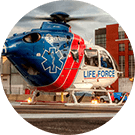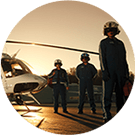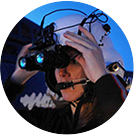Todd Branda, a Base Pilot Supervisor at Air Evac 129 in Idabel, Oklahoma, never gave his career as an air medical pilot much thought—until Air Evac Lifeteam helped save his newborn daughter’s life.
An Army veteran, Todd was thrilled when his daughter, Amelia Jo, was born on Veterans Day, November 11, 2020. “Amelia Jo is a miracle on so many levels,” Todd said. “She is an IVF baby for my wife Erica and me.”
Erica is a nurse, and six days after her daughter was born, she knew something wasn’t right. “She was so fussy, but she didn’t have any other symptoms,” Erica said. “Erica was feeding her and tried to burp her,” Todd recalled. “Amelia Jo quit breathing.”
Their baby girl had a rare form of bacterial meningitis and was suffering seizures. “I feel like my nursing all went out the window, but my body instinctively did everything it needed to do,” Erica said.
Todd managed to dial 911. “You need to get 129 here,” he told the dispatcher. His Idabel crew was on another flight, but the De Queen, Arkansas crew was already on the way.
Flight paramedic and Base Clinical Lead Michael Sipes knew the flight location and the weight of the patient, and thought, “I sure hope that’s not Todd’s baby.” Sipes said, “Knowing the crew is flying a baby adds a whole other level. It’s even more personal when you know the family.”
McCurtain County EMS transported Erica and Amelia Jo to the airport, while Todd followed. “From the time Todd called 911 to the time Air Evac arrived was maybe 25-30 minutes,” Erica said.
The De Queen Air Evac Lifeteam crew flew tiny Amelia Jo and Erica to Dallas Children’s hospital. The pilot, so used to being in the air, was now on the ground driving over three hours to reach his newborn daughter.
“They immediately started her on three different types of antibiotics for three different causes, and they figured it was meningitis,” Todd said. “They didn’t have an hour to spare.”
If it wasn’t for Erica and her expertise, the 911 dispatchers and EMS, and Todd’s Air Evac Lifeteam family, Amelia Jo would not have made it. This Veterans Day baby was a Christmas miracle.
And the staff at Dallas Children’s? “The hospital staff went above and beyond,” Todd said. “They had no less than 30 medical professionals working on her throughout the whole stay.” Amelia Jo spent 15 days in the NICU before returning home.
Todd looked back on the many times he and his team loaded a patient onto his helicopter. “I’ve spoken to families as we took their loved one,” he said. “I’ve told them we will take good care of them and get them to the hospital safely.” It’s what he thought might give them comfort. “Now I can tell them, I’ve been in your shoes.”
Frequently Asked Questions:
If an AirMedCare Network Provider does not transport you, you will be responsible for payment. Our membership program only covers transports provided by our affiliates.
There is no limit to the number of transports a member may take in a year. Each transport is handled the same way and must be an emergent or time-sensitive transport as determined by a physician (or other appropriate provider) or first responder unaffiliated with AMCN.
With an AirMedCare Network membership, any person or persons who reside under one (residential) roof are covered. In the event we have a member who lives in a duplex or apartment complex, we designate the primary member’s residence/address— that is considered the “one roof”. Undergraduate college students can be covered under their parent’s membership as well as anyone previously residing in the household who is then moved to a permanent care facility.
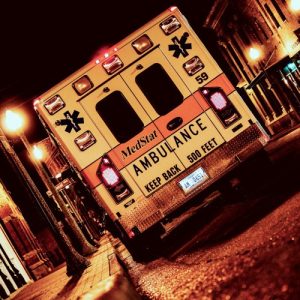
The No Surprises Act and Air Ambulance Costs: What Protections Do You Really Have?
Imagine you’re on a ladder taking down Christmas lights, cleaning the gutters or doing routine house maintenance when it happens. You wake up in pain
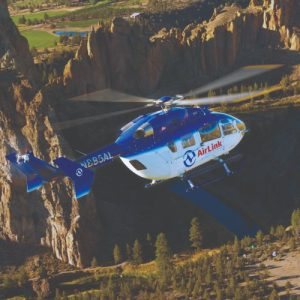
What are the advantages of using air medical transportation?
An air ambulance is a specialized airplane or helicopter that transports sick or injured individuals to the hospital quickly. It is equipped with medical equipment
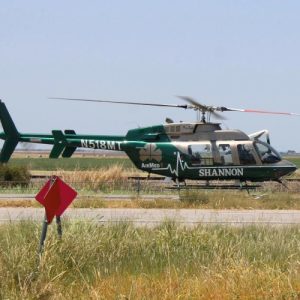
Navigating Common Health Issues in Rural Areas
Rural areas in the United States are home to about 14% to 19% (1) of the population, which means millions of people live outside big


